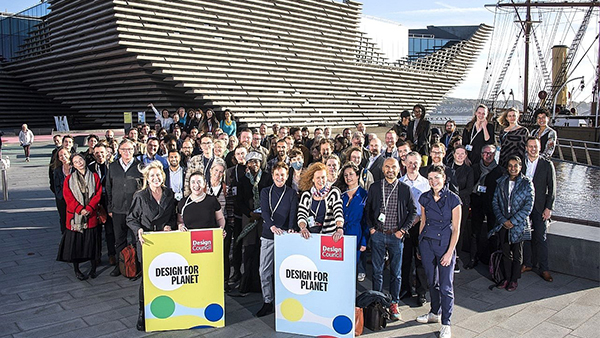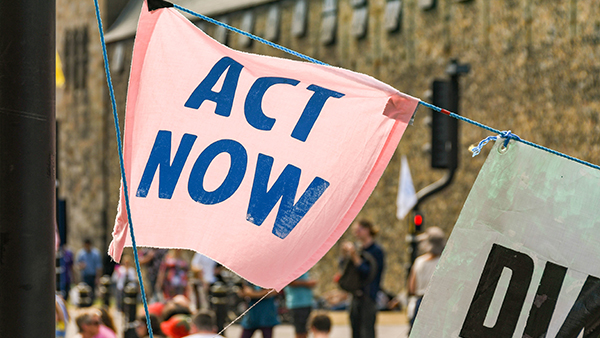From her research with terminally ill patients, psychiatrist Elisabeth Kübler-Ross described grief as a process of five stages: denial, anger, bargaining, depression and acceptance. Are we in the process of grieving for a dying planet?
First there is denial. People have been talking about ecological collapse at least since Rachel Carson’s ‘Silent Spring’ in 1962, but for the most part, society ignored those concerns. Over the following decades activists began to take a stand. Action was often fuelled by anger, with some activists gaining a reputation for damage in the act of blocking activities deemed destructive to the planet. In the face of this anger, international institutions began to take action. This came in the form of specific international agreements (eg limits to Chlorofluorocarbon emissions and on ocean pollution) and economic innovations (eg carbon trading and carbon taxing), bargaining between the international drive for economic growth and the growing awareness of ecological limitations. And this is where the climate movement has stalled, between the bargaining elites and angry activists. The questions that face us, however, are much bigger. They are questions of ethics - is it right and just to continue in this paradigm at the expense of all other life on this planet?
Society has faced moral questions of this scale in the past. Take, the abolition of slavery. Although it is abhorrent to think now, at the time this was a complex ethical question with significant economic implications. Activists, campaigners and social movements worked to bring pressure for legislative change. The legislative shift in values was enabled by economic mechanisms - the state compensated slave owners for the freedom of slaves. This was the largest transfer of taxpayer wealth to the elite that the world had ever seen and remained so until the bailout of the banking sector after the 2008 financial crash.
To be clear, the legislative change came first and the economic mechanisms to enable it came second. Slavery was not abolished by releasing funding for innovation that might incrementally reduce the time an individual was a slave. Slavery was not abolished by implementing taxes on slave ownership. Nor was abolition left to ‘consumer choice’ crassly applying the same economic language that we use today. Legislative action abolished slavery and the economic reinforcements followed. We sit in an interestingly similar time. Just as slave ownership was less economical with the rise in industrial technologies, climate change is causing our current economic systems to falter.
This is the moral ground in which environmental activism now finds itself. After decades in an irreconcilable economic paradigm that makes it near impossible to face up to the huge questions that lie before us, the economic seas are shifting. The rising tide of climate activism appears to be shifting too. What feels different this time is that activists are moving away from anger and instead are acknowledging the depression that so many are feeling. Perhaps this represents a step to move to the next phase of our collective grieving process. The new Extinction Rebellion movement has made the mourning process central to its activities. Their march on Saturday, for example, “mourned all the life we’ve lost, are losing and are still to lose.”
In the wake of admissions that the BBC gets climate change coverage wrong too often and as David Attenborough admits that they hide the realities of ecosystem destruction from viewers there may well be value to reconsidering other areas of our society in the context of a collective grieving process. What would the effect be of the BBC removing climate deniers (who represent less than 2% of climate scientists) and giving representative air time to climate bargainers and climate mourners? Could this move the public debate forward?
Of course, not all people and communities are at the same stage of the grieving process and this needs to be acknowledged and supported. This requires processes that enable groups of individuals to discuss difficult topics and make thoughtful decisions while putting citizens at the heart. Deliberative processes like our work on the Citizens Economic Council do just that. Interestingly, this has been echoed in this recent wave of environmental activism, with Citizens Assemblies being suggested as an important tool.
Historically we can see that the moral compass of societies can shift when people in positions of power and privilege begin to support those that are oppressed - when men supported women’s suffrage, when white people supported the civil rights movement, when the middle classes in India and Brazil supported social movements there. Ecological collapse is a global issue. It requires the globally privileged - we in the rich countries of the world - to stand up and support those that are feeling the effects right now.
If our society is ever to reach the acceptance stage in grieving our planet, in which we take the urgent and necessary steps required to prepare and adapt as a society, then taking the next step along the grieving process is essential.
Related articles
-
A design revolution for the climate emergency
Joanna Choukeir
Joanna Choukeir on Design for Planet, the global gathering of designers during COP26, and the changes design must make.
-
The public are ready to go further and faster on net zero
Anthony Painter
The public are ahead of policy-makers and, indeed, most of the business world. COP26 is an enormous opportunity to catch up. Global leaders should take it.
-
Everyday deliberation and climate action
Abigail Campbell
All eyes are on Climate Assembly UK in Birmingham this month. But across our region, RSA Fellows are leading the way on smaller-scale deliberative events on the climate emergency.




Join the discussion
Comments
Please login to post a comment or reply
Don't have an account? Click here to register.
Lynne: I fear you are correct. The environmental movement needs to face that fact that is has lost a noble fight and we must begin the process of mourning for Planet Earth and life as we know it now. Life will go on, after we are gone, but it cannot continue as long as Homo sapiens is still around